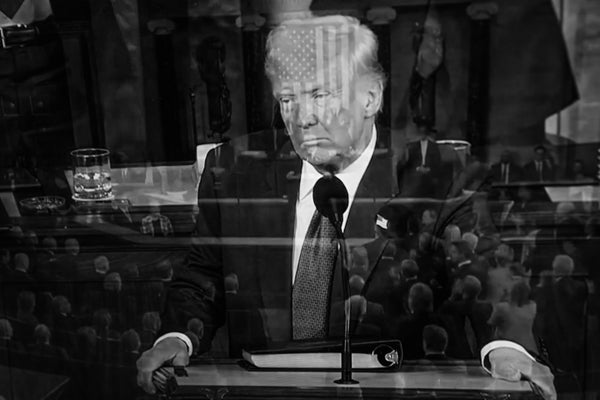4 min read
Science Tells Us the U.S. Is Heading toward a Dictatorship
The red flags abound—political research tells us the U.S. is becoming an autocracy

As president, Donald Trump pretty much checks all the warning boxes for an autocrat. Last September Scientific American warned of Trump’s “nonsensical conspiracy fantasies,” that he “ignores the climate crisis” and has fondness for “unqualified ideologues,” whom he would appoint should he become president again. It’s now May and sadly, that all checks out.
The U.S. is in a bad place and, scholars warn, looks to be headed for worse.
Worse even than Trump’s relentless attacks on science have been his administration’s assaults on the law. His officials have illegally fired federal workers, impounded congressional appropriations and seized people off the street for deportations to foreign prisons, threatening the same for all U.S. citizens. “The depth and breadth of this administration’s disregard for civil liberties, political pluralism, the separation of powers and legal constraints of all kinds mark it as an authoritarian regime,” law professor David Pozen of the Columbia University School of Law told the New York Times in April.
We should all be worried that the U.S. is headed toward an autocracy—government by one person—even without political science offering a warning. But scholarship on how nations descend into this unfortunate state, seen in places like Turkey and Hungary, might not surprise you with what it suggests about the U.S.
“Since Donald Trump’s inauguration, the country has embarked on the slippery slope toward autocracy,” concludes political scientist Daniel Stockemer of the University of Ottawa, in a May report in Politics & Policy. Rather than a coup, Trump’s attacks on law firms, universities, immigrants and others constitute “a more incremental form of democratic erosion,” he writes, one that follows a six-step theory of incremental autocratization based on research on the democratic backsliding seen worldwide in recent decades. The model arose in major part from the work of political scientist Marianne Kneuer of the Dresden University of Technology. She looked at the last quarter-century’s collapse in Venezuela, examining how states turn from democratic to autocratic in stages, as opposed to a sudden coup.
The U.S. has already breached the first three steps of Stockemer’s theory. The first step is one of social turmoil; this originated with the Tea Party movement during the Obama administration. Marked by angry politics, backlash against minorities and immigrants, and distrust in institutions, the U.S. has in the last two decades changed from a “full” to a “flawed” democracy, according to the Economist’s global democracy index.
The second step requires a “project of radical change,” like the populist movement of Venezuela’s Hugo Chavez in the 1990s, or in the U.S. case Trump’s MAGA movement, which defends white, male privileges and holds prime loyalty for many Republicans.
The third step is a “decisive electoral victory,” applicable to Chavez in 1999 or Trump in 2024, the latter a vote that also brought Trump control of a subservient Congress.
That leaves us at the edge of the fourth step, the dismantling of checks and balances on executive power.




Nessun commento:
Posta un commento